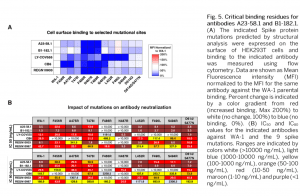Since the emergence of SARS-CoV-2, there have been multiple variants of the virus that have emerged including variants of concerns (VOCs) Alpha (B1.1.7), Beta (B.1.351), Gamma (P.1) and Delta (B.1.617.2). These VOCs have mutations in the S protein which contribute to either increased transmissibility, increased pathogenicity, or both. Additionally, mutations in the VOCs contribute to lower antibody neutralisation capacity by vaccines induced by SARS-CoV-2 infection or COVID-19 vaccines, as well hinders the provision of convalescent plasma as a potential treatment for COVID-19. In a recent study, Wang and colleagues aimed to isolate potent neutralising antibodies (nAbs) that have activity against VOCs as well as other SARS-Cov-2 variants, as well as determine in vitro whether these potent nAbs have therapeutic potential and reduce resistance development.
Wang et al., isolated SARS-Cov-2 specific antibodies from 22 donors infected with SARS-CoV-2 variants that had identical S-protein sequences to the first ever sequenced SARS-Cov-2 genome [detected in Wuhan (Hu-1)]. Using in vitro antibody binding and neutralisation assays the demonstrated that potent nAbs (A12-58.1, B1-182.1 and A19-61.1) had high affinity and neutralisation capacity against VOCs. Additionally, they presented data that “defined the structural and functional determinants of binding for all four VOC-targeting antibodies and show that combinations of two antibodies decrease the in vitro generation of escape mutants, suggesting their potential in mitigating resistance development.” Further, in vitro analysis also demonstrated that potent nAbs also outperformed existing Abs available for immunotherapy, this was because potent nAbs because they bound the antigen sites that were unaffected by mutations in the VOCs. Researchers concluded that “these data establish the rationale for a vaccine boosting regimen that may be used to selectively induce immune responses that increase the breadth and potency of antibodies targeting specific RBD regions of the spike glycoprotein (e.g., VH1-58 supersite). Since both variant sequence analysis and in vitro time to escape experiments suggest that combinations of these antibodies may have a lower risk for loss of neutralizing activity, these antibodies represent a potential means to achieve both breadth against current VOCs and to mitigate risk against those that may develop in the future.”
Researchers concluded that “these data establish the rationale for a vaccine boosting regimen that may be used to selectively induce immune responses that increase the breadth and potency of antibodies targeting specific RBD regions of the spike glycoprotein (e.g., VH1-58 supersite). Since both variant sequence analysis and in vitro time to escape experiments suggest that combinations of these antibodies may have a lower risk for loss of neutralizing activity, these antibodies represent a potential means to achieve both breadth against current VOCs and to mitigate risk against those that may develop in the future.”
Journal Article: Wang et al., 2021. Ultrapotent antibodies against diverse and highly transmissible SARS-CoV-2 variants. Science
Summary by Cheleka AM Mpande










